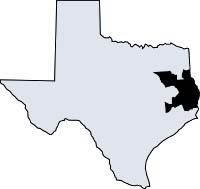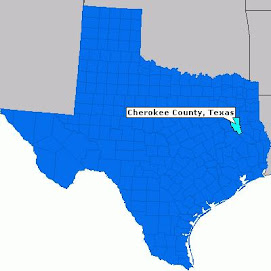Texas House of Representatives District 11:
Voter fraud is a crime against our most sacred rights as Americans. In Cherokee County incumbents can rely on benign looking old ladies volunteering at the voting booth to falsify election results in their favor. Their job is to pervert the outcome of every election, no matter how inconsequential the political position. They've been doing it for decades and it is the same type of blue-haired biddies every election cycle. However, when they defraud the outcomes of Congressional elections, results affect the entire State.
Another election in the crapper thanks to Cherokee County voter fraud. That’s their track record and we've been reading about it since the days of Lyndon B. Johnson. Apparently ballot voting in this region is tongue-in-cheek and the Attorney General's office is complacent with election results. As an added bonus, elected officials quickly register bogus ballot counts and the local media reports the counterfeit results before the Secretary of State can certify the election. Even in the age of mandatory electronic voting.
Terrorist organizations such as Hamas and Hezbollah harbor their rogue activities from reprisal by sheltering them within houses of worship and schools. They know public opinion will be in their favor by stationing themselves within these sanctuaries and they are free to conduct their assault on Freedom. Similarly, the Cherokee County Commissioner's Court, County Judge, et al have chosen the community churches as the best places in which to conduct voter fraud while cloaked behind the facade of presumed benevolent and guileless environments.
(Source: Cherokee County Commissioners Court October 14, 2008 meeting)
Published Cherokee County, TX polling locations by precinct on the county Public Meeting Notice:
#10, Northeast, Rusk Civic Center
#11, East Rusk, Blount Chapel Baptist Church
#12, North Rusk, Gallatin Community Center
#13, North Maydelle, First Baptist Church
#14, Southeast Jacksonville, Corinth Baptist Church
#15, Ward #3 City of Jacksonville, Tyler St. Baptist Church
#16, Dialville, Dialville Methodist Church
#23, South Rusk, Salem Baptist Church Hwy 241
#24, Rusk, Cherokee Civic Theater in Shriner Bldg/5th St.
#25, Wells,City Fire Station
#26, East Alto, Calvery Tabernacle United Pentecostal Church
#27, West Alto, City Fire Station Hwy 21
#28, South Maydelle, Assembly of God Church
#29, Forest Baptist Church
#32, Mt.Selman Baptist Church
#33, Reese Community Center, Hwy. 175
#34, Mixon First Baptist Church
#35, Cove Springs Baptist Church, Hwy 175
#36, S W Jacksonville, New Hope Baptist Church FM 747
#37, Mt. Haven CME Church
#38, Ward #2, City of Jacksonville Activity Center Peoples Street
#42, Ward #1, City of Jacksonville Old Elberta St. School
#43, Ward #4, City of Jacksonville Public Library
#44, Northeast Jacksonville Tecula Baptist Fellowship Hall
#45, New Summerfield First Baptist Church
#46, Pleasant Hill Blackjack Baptist Church
#47, Ponta First Baptist Hwy 110
#48, Concord Presbyterian Church, CR 4705 FM 856
Like a fundamentalist terrorist, these seemingly gentle old church moms would cut your head off as soon as your back was turned. They are the backbone of the culture of corruption and they volunteer their time to keep their kith and kin in office. When the biddies aren't busy listening in on private phone conversations for the district attorney's office, they're stuffing ballot boxes and filling out fake provisional voter registration cards. And tossing out challengers' votes as fast as shucking peas.
Incumbent State Representative and Jacksonville, TX resident Chuck Hopson (D) 'won' the November 4th Texas House District 11 race by this same tried and true technique. Hopson's opponent challenged the results and requested a supervised recount. A senior citizen election official squeaked out an extra 104 votes during the December recount and Cherokee County’s incumbent State Representative was sent back to Austin for another term. Chuck Hopson, a conservative Democrat and honorable politician in his own right defends the blatant voter fraud and corrupt election process from his hometown district. Texas House District 11 is composed of Henderson, Panola, Houston and Cherokee County. Hopson's challenger was Republican Brian Walker of Panola County, TX.
TX HD 11
On election night and after a “recount,” Rep. Hopson’s home district in Jacksonville, Texas – Precinct 36, or “Box 36,”provided the 100 + fraudulent votes needed to save his seat. Challenger Brian Walker had been ahead of Hopson on election night, until Box 36 came strolling in three hours after the polling booths closed, giving Hopson the votes to remain in office. Polling place No. 36 is located in on FM 747 in South West Jacksonville at the New Hope Baptist Church. Go figure.
Because the blatant mislabeling of ballot boxes was being questioned by the Walker campaign, the Cherokee County Commissioner's Court rushed to form a canvas board of local relatives of the election judges.
Candidate Brian Walker petitioned the Texas House of Representatives for a recount and an investigation. Walker’s formal request contends Cherokee County acted in violation of Texas electoral procedures and allowed fraudulent provisional votes to be cast for the incumbent. At the same time, other votes in his favor were tampered with and/or discarded. The bulk of tossed out votes were overseas ballots of service men and women with legal residency in Cherokee County. Before the Texas House of Representatives convened to hear the petition, Walker withdrew his request for a formal hearing.
Brian Walker contested the certification of the election that Cherokee County is in violation of the Texas Election Code. These are election laws broken by election officials:
NUMBER ONE: 900 cast votes, enough to swing the close election, were never properly sealed nor locked once Cherokee County was notified of a recount. These ballot boxes remained with members of the Hopson camp until they were subpoenaed.
ELECTION CODE
TITLE 6. CONDUCT OF ELECTIONS
CHAPTER 66. DISPOSITION OF RECORDS AND SUPPLIES AFTER ELECTION
Sec. 66.058. PRESERVATION OF PRECINCT ELECTION RECORDS.(a) Except as otherwise provided by this code, the precinct election records shall be preserved by the authority to whom they are distributed for at least 22 months after election day.
(b) For a period of at least 60 days after the date of the election, the voted ballots shall be preserved securely in a locked room in the locked ballot box in which they are delivered to the general custodian of election records. On the 61st day after election day, the general custodian of election records may:
(1) require a person who has possession of a key that operates the lock on a ballot box containing voted ballots to return the key to the custodian; and
(2) unlock the ballot box and transfer the voted ballots to another secure container for the remainder of the preservation period.
(b-1) Except as permitted by this code, a ballot box or other secure container containing voted ballots may not be opened during the preservation period.
(c) If during the preservation period an authorized entry is made into a ballot box or other secure container containing voted ballots, when the purpose for the entry is fulfilled, the box or container shall be relocked or resecured, and the box and key or secure container returned to the custodian.
(d) A custodian of a ballot box or secure container containing voted ballots commits an offense if, during the preservation period prescribed by Subsection (a), the custodian:
(1) makes an unauthorized entry into the box or container; or
(2) fails to prevent another person from handling the box or container in an unauthorized manner or from making an unauthorized entry into the box or container.
(e) An offense under Subsection (d) is a Class A misdemeanor.
(f) The records in ballot box no. 4 may be preserved in that box or by any other method chosen by the custodian. If the records are removed from the box, they may not be commingled with any other election records kept by the custodian.
(g) Repealed by Acts 2007, 80th Leg., R.S., Ch. 1197, Sec. 2, eff. June 15, 2007.
Acts 1985, 69th Leg., ch. 211, Sec. 1, eff. Jan. 1, 1986. Amended by Acts 1997, 75th Leg., ch. 1078, Sec. 18, eff. Sept. 1, 1997; Acts 2003, 78th Leg., ch. 1315, Sec. 40, eff. Jan. 1, 2004.
Amended by:
Acts 2005, 79th Leg., Ch. 950, Sec. 1, eff. September 1, 2005.
Acts 2007, 80th Leg., R.S., Ch. 1197, Sec. 1, eff. June 15, 2007.
Acts 2007, 80th Leg., R.S., Ch. 1197, Sec. 2, eff. June 15, 2007.
NUMBER TWO: The election judge of Representative Hopson’s home district was not appointed in accordance to the Texas Election Code; rather she is a Chuck Hopson “volunteer.” This election judge was not on the roster authorized by the Cherokee County Commissioner’s Court.
ELECTION CODE
TITLE 3. ELECTION OFFICERS AND OBSERVERS
CHAPTER 32. ELECTION JUDGES AND CLERKS
SUBCHAPTER A. APPOINTMENT OF ELECTION JUDGES
Sec. 32.001. PRESIDING JUDGE AND ALTERNATE FOR EACH ELECTION PRECINCT. (a) A presiding election judge and an alternate presiding judge shall be appointed for each election precinct in which an election is held.(b) The alternate presiding judge shall serve as presiding judge for an election if the regularly appointed presiding judge cannot serve.
Acts 1985, 69th Leg., ch. 211, Sec. 1, eff. Jan. 1, 1986.
Sec. 32.002. JUDGES FOR COUNTY ELECTION. (a) The commissioners court at its July term shall appoint the election judges for each regular county election precinct.
(b) Judges appointed under Subsection (a) serve for a term of one year beginning on August 1 following the appointment, except that the commissioners court by order recorded in its minutes may provide for a term of two years.
(c) The presiding judge and alternate presiding judge must be affiliated or aligned with different political parties, subject to this subsection. Before July of each year, the county chair of a political party whose candidate for governor received the highest or second highest number of votes in the county in the most recent gubernatorial general election shall submit in writing to the commissioners court a list of names of persons in order of preference for each precinct who are eligible for appointment as an election judge. The county chair may supplement the list of names of persons until the 20th day before a general election or the 15th day before a special election in case an appointed election judge becomes unable to serve. The commissioners court shall appoint the first person meeting the applicable eligibility requirements from the list submitted in compliance with this subsection by the party with the highest number of votes in the precinct as the presiding judge and the first person meeting the applicable eligibility requirements from the list submitted in compliance with this subsection by the party with the second highest number of votes in the precinct as the alternate presiding judge. The commissioners court may reject the list if the persons whose names are submitted on the list are determined not to meet the applicable eligibility requirements.
(d) The county clerk, after making a reasonable effort to consult with the party chair of the appropriate political party or parties, shall submit to the commissioners court a list of names of persons eligible for appointment as presiding judge and alternate presiding judge for each precinct in which an appointment is not made under Subsection (c). The commissioners court shall appoint an eligible person from the list who is affiliated or aligned with the appropriate party, if available.
(e) The commissioners court shall fill a vacancy in the position of presiding judge or alternate presiding judge for the remainder of the unexpired term. An appointment to fill a vacancy may be made at any regular or special term of court. Not later than 48 hours after the county clerk becomes aware of a vacancy, the county clerk shall notify the county chair of the same political party with which the original judge was affiliated or aligned of the vacancy. Not later than the fifth day after the date of notification of the vacancy, the county chair of the same political party with which the original judge was affiliated or aligned shall submit to the commissioners court in writing the name of a person who is eligible for the appointment. If a name is submitted in compliance with this subsection, the commissioners court shall appoint that person to the unexpired term. If a name is not submitted in compliance with this subsection, the county clerk shall submit to the commissioners court a list of names of persons eligible as an appointee for the unexpired term. The commissioners court shall appoint an eligible person from the list who is affiliated or aligned with the same party, if available.
(f) Subject to Section 32.003, the judges appointed under this section shall serve in each election ordered by the governor or a county authority in which the regular county election precincts are required to be used.
Acts 1985, 69th Leg., ch. 211, Sec. 1, eff. Jan. 1, 1986. Amended by Acts 1997, 75th Leg., ch. 1349, Sec. 8, 9, eff. Sept. 1, 1997; Acts 1999, 76th Leg., ch. 1009, Sec. 1, eff. Sept. 1, 1999.
Amended by:
Acts 2005, 79th Leg., Ch. 89, Sec. 1, eff. September 1, 2005.
NUMBER THREE: Of all the electronic and more accurate voting machines, Hopson’s home precinct relied on paper ballots, based upon a “malfunction” that was never reported. In typical Cherokee County fashion, polling places allowed bystanders access to ballot boxes, while feigning a ‘friendly good old fashion’ political setting. Cherokee County remains off the map as county officials will not allow the Texas Election Administration Management (TEAM) system access to its fraudulent votes. Cherokee County prefers to remain in the dark ages instead of implementing a secure computerized voter management system. They get a kick out of submitting falsified voter returns.
ELECTION CODE
TITLE 13. RECOUNTS
CHAPTER 214. COUNTING PROCEDURES
SUBCHAPTER A. MANUALLY COUNTED BALLOTS
Sec. 214.046. TEST OF PROGRAM AND EQUIPMENT. (a) After the time set for beginning an electronic recount but before the recount is made, the recount tabulator shall conduct a test of the program and equipment in the same manner as the test that is conducted immediately before an original count of ballots for an election. Each person entitled to notice of the recount or the person's representative at the recount is entitled to examine the program and the test materials on request.
(b) If the test is unsuccessful, the recount tabulator shall notify the recount committee chair, who shall notify the recount supervisor, and the supervisor shall investigate the cause of the test's failure. The electronic recount may not proceed until a test is successful on the equipment used for the first test or on other equipment selected by the supervisor.
(c) If the recount supervisor determines that the program is defective, the supervisor shall inform the person requesting the recount or the person's agent. The person requesting the recount may notify the supervisor:
(1) to have the ballots recounted manually; or
(2) to attempt to correct the program so that an electronic recount may be conducted with the corrected program.
(d) A recount using a corrected program may not be made unless the tabulation supervisor of the central counting station or the presiding election judge of the polling place at which the ballots were counted, as applicable, and the person who prepared the program sign a written statement indicating that the original program is defective. If the statement cannot be obtained, the recount supervisor shall have the ballots recounted manually.
(e) If a recount using a corrected program is to be made, the original program shall be preserved without change and a complete new program shall be prepared. The original set of test materials shall also be preserved without change and a complete new set shall be prepared if the original set is unsuitable for testing the corrected program.
(f) The recount supervisor shall obtain from the person who prepares a new program a signed statement that the program was prepared by the person, with the date of preparation and the person's address shown on the statement. The new program, the preparer's statement, and the test materials used for verification shall be preserved in a sealed container in the same manner and for the same period as the original program.
(g) The costs of a recount under Subsection (c) may not be assessed against a person regardless of its outcome. If other precincts are included in the same recount document, the assessment of the costs in the other precincts shall be determined by the overall outcome in all precincts included in the document.
Acts 1985, 69th Leg., ch. 211, Sec. 1, eff. Jan. 1, 1986. Amended by Acts 1997, 75th Leg., ch. 864, Sec. 224, eff. Sept. 1, 1997.
NUMBER FOUR: On election night November 2nd, the ballot box from Rep. Hopsons’ home precinct arrived at the courthouse at 9:45 pm - nearly three hours after the polls had closed. This voting precinct is twenty minutes from the courthouse in downtown Rusk, TX. The election judge gave different accounts of why she was late for vote tally.
NUMBER FIVE: The ballot box from Rep. Hopson’s home voting precinct, as well as others throughout Cherokee County, was a plain cardboard box, not a padlocked metal container as required by Code. After election night and prior to the physical recount, all boxes' seals had been removed and tampered with.
NUMBER SIX: Cherokee County, TX refused software tests and calibration of its voting machines prior to the December recount.
NUMBER SEVEN: Rejected ballots were never provided for scrutiny.
NUMBER EIGHT: Every ballot register the County Clerk certified was falsified; all 31 voting precincts in Cherokee County had different totals certified than were actually serialized on the boxes. Many precincts failed to record the actual amount tallied on election night on the ballot boxes.
NUMBER NINE: Cherokee County election officials added votes during the recount computation that were never matched nor reported. Voters from outside House District 11 were allowed to cast their secret ballots. Ballot registers have never been made available to the Walker campaign. Nonetheless, Walker withdrew his petition.
Brian Walker conceded to Chuck Hopson on December 22, 2008 but told the Tyler Paper his investigation of voter fraud in Cherokee County would continue. The Secretary of State would have to throw out the last 50 years of elections in Cherokee County if that were the case. The Texas legislature is currently divided by party lines at a close 76/74. The political melee of contesting what the Speaker of the House must view as an insignificant House seat would bring Cherokee County out of the dark and into the sunlight. Apparently nobody can stomach the rats and roaches scrambling in the slime when the eyes of the State are on them. The legacy of Cherokee County providing falsified information about its systemic corruption continues. The only question is whether or not the Attorney General's office is going to certify it.
The alternate Universe of Cherokee County, TX newspapers:
Sensing the coast is clear from an Attorney General’s investigation into the stolen election, the Rusk, Texas Cherokeean Herald rubs the victory of their chosen incumbent in the face of the Brian Walker campaign. The daughter of the editor compares Republican Brian Walker to the “Wizard of Oz” and chastises him for not responding to the newspaper's phone call interviews during the recount.
Beginning the day of the Nov. 4 General Election and continuing until last week, Mr. Walker and his staff have dodged more than 25 calls from the Cherokeean Herald.
With every twist and turn down this yellow brick road, the Cherokeean Herald attempted to call Mr. Walker for reaction to basic questions.
In contrast, the lines of communication with state Rep. Chuck Hopson (D-Jacksonville) and state Sen. Robert Nichols (R-Jacksonville) have always been prompt, even if their staff had to research a question.
If the Wizard of Oz isn't available to take calls, does anyone have the cell phone number for the guy in the control booth pushing the buttons?
The fact is the Brian Walker campaign did not have Mr. Walker’s grandmother operating as an election judge in Cherokee County. Mr. Walker did not have operatives working as election judges in swing precincts. The only county with the ongoing history of voter fraud and stolen elections is the hometown of the Cherokeean Herald. The only county embroiled in a contested election is the Herald's.
Mr. Walker is smart enough to smell the corruption of a stolen election and equally astute enough not to give interviews to the enemy. Furthermore, the Cherokeean Herald has a 30-year track record of making up fictitious stories for print, without any fact checking by an outside entity. The Cherokeean Herald will not report on the federal crimes of its law enforcement, Post Office employees or kinfolks. Certainly Brian Walker and associates have found a good use for the Rusk, Texas newspaper- lining litter boxes and bird cages. The fact is the editor's hometown Pravda, the Cherokeean Herald, has an eerie resemblance to Nazi propaganda fast forwarded to the present.
County officials quick to certify the voter fraud understood what type of scrutiny they would be exposed to with a Brian Walker victory. The Cherokeean Herald has been unabashedly in support of the Chuck Hopson reelection since the March 2007 primaries. And constantly deflecting the reality of resident child molesters on probation and living amongst them. Probation given to them by Cherokee County’s Elmer Beckworth and the district courts lazily pushing offenders through the docket.
To his credit, State Representative Chuck Hopson (D) introduced legislation in 2005 that would prevent convicted sex offenders receiving State subsidized erection enhancement drugs. Other legislation on the books for Federal Prosecutors includes the Adam Walsh Act, in 18 United States Code 2250, making it a federal crime for sex offenders to travel across state lines and fail to register. More recently is Jessica’s Law, ignored by Cherokee County, TX prosecutors unless it gets a blurb in the paper or the defendant isn't a blood-relative.
Rusk, Texas:
After 18 months of Jessica’s Law being the law of the land and after decades of legal precedent, Cherokee County prosecutors decide that ongoing incestuous relations are illegal, but only to offenders they haven't placed on the next jury pool. Jessica’s Law, introduced as House Bill 8 in Texas, became law on September 1, 2007. Under the provisions of HB 8, legislators proposed a 25 year minimum sentence for first time offenders convicted of child molestation. Dual legislation also created a new offense called “Continuous Sexual Abuse of a Young Child.” Jessica's Law has proven to be an effective weapon for prosecutors willing to prosecute Indecency with Minor charges known to have been ongoing. It was design to be used in every case a sex offense against a child occurs; the law’s origin was not created to be used at the discretion of small town district attorneys trying to get their names in the paper. Children in Cherokee County, TX have been continually abused physically and sexually for decades. The local media helps cover this up. Hence after a year and half of Jessica’s Law being on the books, Cherokee County finally comes out the dark ages.
A quick check of the local newspapers archives of the last 18 months shows only a few cases of unlawful acts with children get prosecuted to the fullest extent of Jessica's Law. In a recent Tyler Paper interview, the Cherokee County District Attorney office boasts the December 10, 2008 conviction of George Henry Williams, Jr. Of course, Williams is not directly related to anyone in the Rusk, TX courthouse.
Like his forefathers and those shielding his conduct, Williams engaged in a continuous incestuous relationship with a 5-year old girl. Prosecutors declined to describe the family connection between Williams and the victim. Had Williams been related to officers of the court, the victim’s story of ongoing assault would have been buried and Jacksonville-based reporters would have written about how great a guy George Williams is to hang out with at the local eatery. Or perhaps thrown his name in as a victim of recent car burglaries. George Williams was arrested on February 3, 2008.
The same District Attorney’s office has instructed their Jacksonville , TX based reporters to ignore the last 18 months the law was in existence. The fact is “Jessica’s Law” has been ignored until someone not related to elected officials arrived on the docket. Anti-pedophile legislation on the books for decades has been available for Texas based district attorneys competent enough to utilize it, without politicizing the crime. HB 8 became the law of the land in 2007, but in the meantime 99 % of the sex offenses in Cherokee County, Texas have been prosecuted as Misdemeanors.
Earlier in May 2008, Jacksonville, Texas resident Glenn R. Wingard (arrested the same day as George Williams) was sentenced to 95 years for aggravated sexual assault of a child. Wingard was arrested one year after the assaults occurred and before Jessica’s Law was enacted. In January, 2008 Rusk, Texas resident Gordon Neal Mathis was sentenced to over 40 years for aggravated sexual assault of a child. That’s it; 3 offenses prosecuted out of the dozens of sex assault cases reported in the Jacksonville Daily Progress since Jessica’s Law became law.
Therefore there has been nothing stopping Cherokee County prosecutors from putting sex offenders on trial other than (1.) the embarrassment of rampant incest throughout the county; and (2.) the embarrassment of prosecuting their previous jury members.
In November 2008 alone, The Jacksonville Daily Progress reported on their back pages the summertime plea bargains of several resident Cherokee County child sex offenders (complete with deliberately misspelled names). These guys received deals not prosecuted under Jessica’s Law:
• Thomas Elledge [sic], sexual assault of a child. The plea agreement was for four years in prison; and
• Justin Paul, aggravated sexual assault of a child. The plea agreement was for eight years in prison.
Not the minimum 25 years established under Jessica's Law.
Rusk, Texas resident and registered sex offender Kevin Lyn Hawes, age 45, was sentenced to 70 years confinement in November 2008 for violating the terms of his probation. Deferred adjudicated probation given to him by District Attorney Elmer Beckworth in 1999, before the invention of the Internet was discovered in Cherokee County. Hawes was arrested in 1998 for attempted sex assault of a 15-year old female. The terms of his 10-year probation sentence included Community Service and not having sleepovers with little kids, both conditions Hawes violated. They pulled straws in the judge's chambers and decided Kevin Hawes needed to be made the sacrificial lamb. Hawes was less than a year from release from Adult Supervison, i.e. probation.

Kevin Lyn Hawes, registered sex offender
Kevin Hawes tried to date rape a 15-year old Rusk, TX girl; Jessica Law would not apply to his case. The fact is the teen testified against Hawes and resulted in his conviction. The Jacksonville Daily Progress reports the Hawes case as if it were in fact a sex crime involving a child much younger, who was unwilling to testify. Hawes probation violations are not prosecutable under Jessica's Law. As a matter of fact, Kevin Hawes' probation revocation has absolutely nothing to do with "Jessica's Law." The Jacksonville Daily Progress would choose their readers to believe otherwise.
And Cherokee County’s Elmer Beckworth continues the lie implied in the article:
Like many cases that deal with victims of this age, many times the victim is unwilling to testify, leading to these cases being dismissed or getting a plea. Thanks to recent changes in the law and more children’s advocacy programs, we’re seeing more and more victims get counseling and are able to testify.
Again, the fact is the 15-year old victim Kevin Hawes attempted to have underage sex with did in fact testify against him. And Hawes' probation violations have nothing to do with Elmer Beckworth’s track record of offering probation to resident Cherokee County sex offenders. God help them if these defendants aren’t related to anybody working in the Rusk, Texas courthouse. Kevin Lyn Hawes is currently(as of January 2009)incarcerated in the Cherokee County jail awaiting transport to TDCJ.
Cherokee County prosecutors have a proven track record lying about their own cases, often just for the sake of diverting attention away from their cronyism. Sometimes they lie just for the ego trip of remaining unchallenged by the local media and in local elections. It keeps the Cult of Confession in check. Not only is Cherokee County steeped in voter fraud, it is immersed in one of the longest ongoing Criminal Court con games in Texas history. This history will be discussed in detail in the coming months along with the upcoming retirement of Criminal Court of Appeals Justice Charles Holcomb. As Cherokee County’s highest ranking State Bar member, Justice Holcomb is mentor to several of Cherokee County’s current swear-ins.
Who will the Governor choose to replace Cherokee County’s favorite son as Justice on what has been called the worst criminal appeals court in the United States? Place 8's appellate Justice won't have to rely on voter fraud to be elected- he or she will get to be appointed by Rick Perry.




